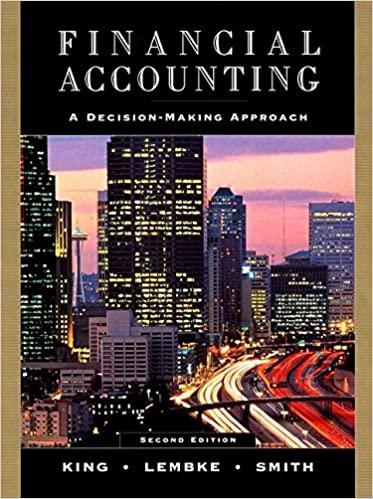Stockholders Equity Transactions The following events and transactions occurred with respect to Wilma Corporation: 2001 1. Wilma
Question:
Stockholders’ Equity Transactions The following events and transactions occurred with respect to Wilma Corporation:
2001 1. Wilma Corporation became chartered on January 1, 2001, and was authorized to issue 20,000 shares of common stock with a stated value of $1 and 1,000 shares of $100-
par, 7 percent preferred stock. It immediately issued 8,000 common shares at a price of $15.
2. A large plot of land and a building were acquired by issuing 1,500 shares of common stock in exchange. At the time of the exchange, the common stock was selling for $22 per share.
3. The company reacquired 1,000 shares of its common stock for $20 per share to be used for employee compensation and future acquisitions.
4. Half of the treasury shares were resold for $28 per share. 5. The remaining treasury shares were sold for $19 per share.
2002 6. On January 1, 2002, Wilma issued 1,000 shares of preferred stock for $101 per share.
7. Wilma declared and distributed a 10 percent stock divi- dend on its common stock. On the date of declaration of the stock dividend, Wilma’s common stock was selling for $21 per share.
8. Wilma declared and paid quarterly dividends on the preferred stock for the first 9 months of 2002. The last quarterly preferred dividend of the year was declared but will not be paid until the first week of 2003.
Wilma reported net income of $31,200 for 2001 and $54,500 for 2002. To examine the changes in Wilma’s stockholders’
equity, do the following:
a. Present journal entries to record each of Wilma’s transactions listed for 2001 and 2002.
b. Prepare Wilma’s statement of changes in stockholders’
equity for 2002.
c. Present the stockholders’ equity section of Wilma’s balance sheet on December 31, 2002.
d. Answer the following questions:
1. From the stockholders’ equity section of the balance sheet, does it appear that Wilma’s operations are successful? Explain.
2. Are there any indications in the stockholders’ equity section of the balance sheet that the payment of cash dividends to common stockholders might be warranted? Explain. Why might Wilma not want to pay cash dividends on common stock in the near future?
3. What is likely to happen to the additional paid-in capital currently reported in Wilma’s balance sheet over the next several years? What will happen to these amounts if Wilma liquidates?
Step by Step Answer:

Financial Accounting A Decision Making Approach
ISBN: 9780471328230
2nd Edition
Authors: Thomas E. King, Valdean C. Lembke, John H. Smith




